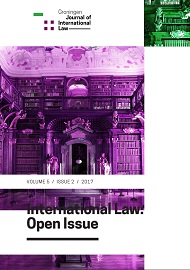In the Name of Climate Change: How Leghari v Federation of Pakistan Is Instrumental to the Pursuit of the Right to Life in the Philippines
DOI:
https://doi.org/10.21827/5a6af9f49574aKeywords:
HUMAN RIGHTS, RIGHT TO LIFE, CLIMATE CHANGE, CLIMATE CHANGE LITIGATION, STATE RESPONSIBILITY, INTERNATIONAL LAW, MANDAMUSAbstract
Climate change is a phenomenon that has pushed the public to turn to the government for solutions. After all, the government has the mandate of protecting the right to life. Despite the adverse effects of climate change, the steps taken by the Philippine government have been surprisingly meagre. As the people continue to experience the wrath of environmental changes, they have not been adequately empowered. Leghari v Federation of Pakistan provides a framework on how an ordinary person can resort to a legal remedy before a domestic court. The Leghari case suggests how an effective response to climate change can be secured through the judicial branch of the government. It identifies the government’s duties regarding climate change and notes the delay in assuming functions, to the detriment of the public. In the Philippines, the bridge connecting the right to life and climate change is far from completion. As an example of ‘climate change litigation’, the Leghari case can be applied by analogy in the Philippines, which is facing threats to the existence of communities. The Philippine government has tried to alleviate the impact of climate change through its agencies and strategies, but to no avail. In this respect, it can be held accountable for failing to protect the right to life.
Published
Issue
Section
Open Access Creative Commons


